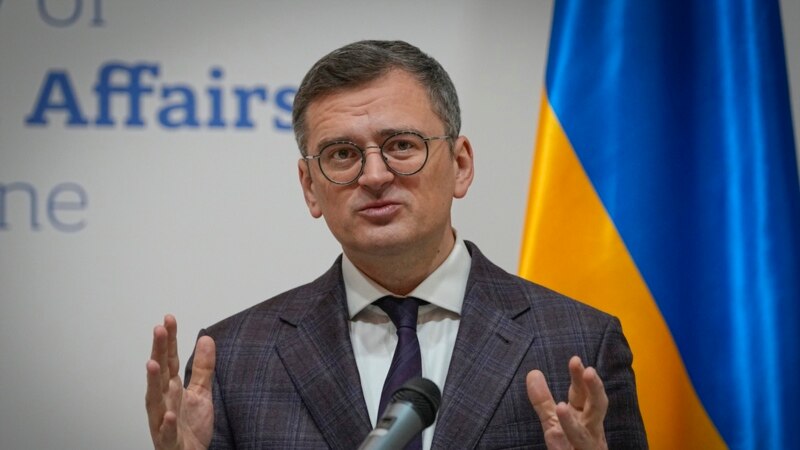Ukrainian officials are forging closer ties with India, pursuing mutual economic interests while hoping to push the Asian giant away from its historically close ties with Kiev’s war foe Russia.
Ukrainian Foreign Minister Dmytro Kuleba visited India from March 28 to 29. This was the first visit to India by a senior Ukrainian diplomat in seven years. A few days ago, the presidents of the two countries spoke on the phone.
Ukrainian Ambassador to India Oleksandr Polishchuk said in an interview with Voice of America that the first priority of Kuleba’s trip is to restore high-level political cooperation.
It was agreed that a senior Indian official would attend this summer’s global peace summit in Switzerland with the goal of supporting Ukraine.
He said India would also work to arrange a visit to Ukraine by its foreign minister and organize other high-level visits. Both sides also agreed to resume the work of the Indo-Ukraine Intergovernmental Committee, which has been idle since 2018.
Kuleba wrote on
“Our immediate objective is to bring trade back to previous levels,” Indian Foreign Minister Subrahmanyam Jaishankar wrote.
during an interview Financial Times (Financial Times) Kuleba said India could benefit greatly from expanding trade and technology ties with Ukraine and participate in post-war reconstruction.
Kuleba pointed out that India’s close relationship with Russia is based on the “Soviet legacy” that is “disappearing”. Data from the Stockholm International Peace Research Institute shows that India’s import of Russian weapons is one of them, with its share falling from 76% in 2009-13 to 36% in 2019-2023.
Polischuk said that since Russia cannot fulfill all its obligations to supply new equipment and spare parts, India is trying to establish its own military production according to Western standards.
“Ukraine can partially meet the needs of the Indian armed forces, especially the navy, as many warships use gas turbine engines produced in Ukraine,” the ambassador said.
during an interview times of india The newspaper also softened Ukraine’s stance on India’s import of Russian oil, saying Ukraine had no objection because the deal was structured in such a way that Russia could not invest profits “in the production of tanks, missiles and weapons.”
The paradox of India-Ukraine relations
Indian Mridulla Ghosh, a lecturer at Mohyla State University in Kyiv, Ukraine, pointed out two paradoxes in the relationship between the two countries.
She told Voice of America that, first of all, relations between India and Ukraine are strengthening, and while the U.S. Congress is unable to approve aid to Ukraine, the United States and some European countries use aid to Ukraine as a bargaining chip in electoral politics. In India, foreign policy is not part of the electoral debate because voters are not interested in it, she said.
Secondly, the highest-level relations between the two countries have warmed up, and Russia has increased its propaganda and influence on Indian society.
“When all-out war began, society was ready to condemn this act of aggression. On the contrary, the authorities reacted with restraint. Now many people in power and in the intelligentsia clearly and correctly understand what is happening in Ukraine. But the media began to actively spread Russian propaganda,” Ghosh explained.
Mediator between Russia and Ukraine?
In New Delhi, Kuleba called on India to play a more active role in the peace process.
“As India becomes more actively involved in the process, we expect the number of countries focusing on India and its role in the process to increase,” Poliszczuk said.
However, observers doubt India’s ability to mediate between Ukraine and Russia or influence Moscow to end the war.
Nandan said that while India has moved closer to the United States and the West in recent years, it “will not take steps that will have a significant impact on Russia’s strategy, just as Russia will not take adverse positions that strategically affect India in favor of China or Pakistan.” “. Unnikrishnan, Distinguished Research Fellow, Observer Research Foundation, Delhi South China Morning Post.
Former US Consul General in India Katherine Hada is skeptical that India will act as a mediator in a peace process where one of the parties is absent – Russia is not participating in the summit based on the peace proposal proposed by Ukraine.
“India stresses that it will act as mediator [only] At the request of both parties,” Hada said in the same article.
Harsh V. Pant, professor of international relations at King’s College London, wrote in a column for India’s NDTV news outlet that it is not India’s job to achieve peace in Eurasia.
“New Delhi hopes that the Russia-Ukraine war will be resolved as soon as possible. But ultimately, the main actors in this conflict – Russia, Ukraine and the West – will decide what kind of Eurasian security architecture they can accept.”
Since the beginning of the all-out aggression, India has not condemned Russia’s actions, abstained from voting on the Ukraine initiative at the United Nations, or joined in imposing sanctions on Russia. Nonetheless, Ghosh believes India is moving away from Moscow.
“The Indian elephant has reacted slowly but steadily. At the beginning of the all-out war, it was reluctant to make strong stance statements, but now it is re-examining a lot of things. It is decoupling from Russia.”
Follow us on Google news ,Twitter , and Join Whatsapp Group of thelocalreport.in
